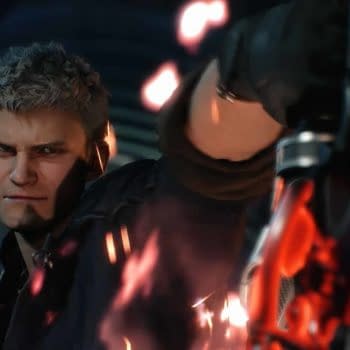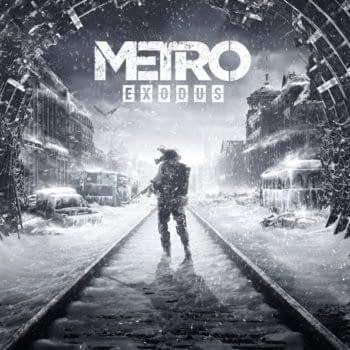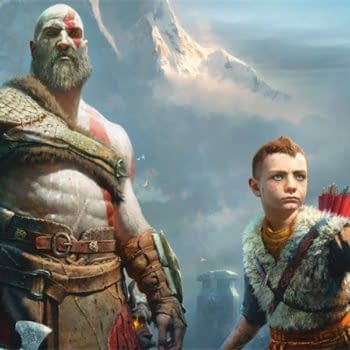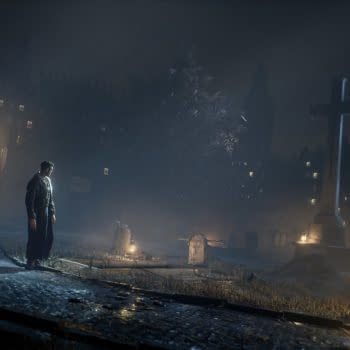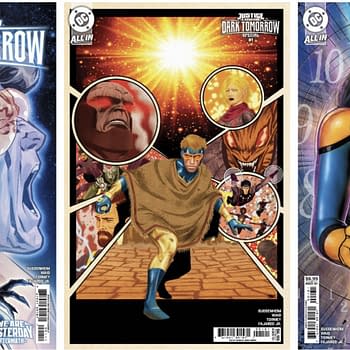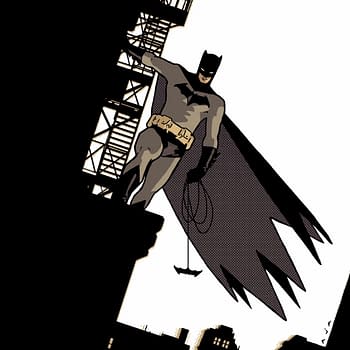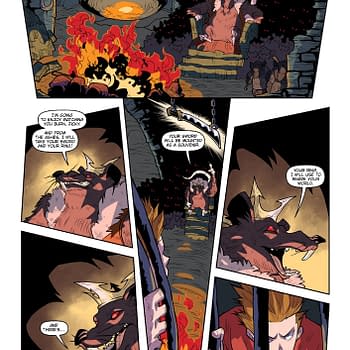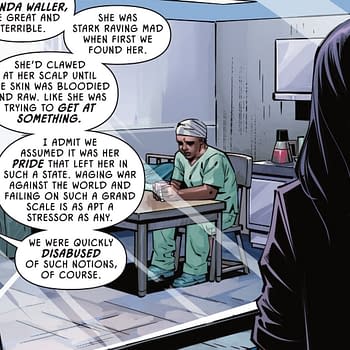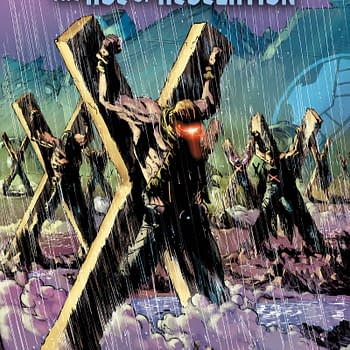Posted in: Comics | Tagged: Comics, conan, conan the barbarian, cullen bunn, dark horse, entertainment
Interview: Cullen Bunn Talks His Upcoming "Conan the Slayer"
By Octavio Karbank
Conan the Barbarian fans are in luck! There's a new Conan series coming out from Dark Horse, entitled Conan the Slayer. Penned by Cullen Bunn, the title promises a bunch of sword-swinging goodness! The comic will hit stands on July 13.
OK: How did you get on the book and pitch the idea for your story?
Cullen Bunn: My editor at Dark Horse, Aaron Walker, actually contacted me and asked me if I was interested in writing Conan. I was, because I've been a Conan fan since I was very, very young. I'm assuming they found me since I was already doing Hero County for Dark Horse, but that's very different in terms of tone and style. I also did a book called Hellheim, a big barbarian story like Conan, so I think that's where they connected those dots.
As far as the pitch goes, it was an interesting series to pitch, because the way Dark Horse does their Conan series is that I'm on the book for twenty-five issues. During those twenty-five issues, I have to adapt two Robert E. Howard stories in the chronology that they appear. Dark Horse follows a certain chronology. So every series that's come before has adapted at least two of those Robert E. Howard stories in a very specific chronology. Outside of that chronology I can add characters, build new stories, and develop subplots that might not have been in the short stories. Basically, I took the two stories that are going to be adapted in my series and I looked at those two stories; I read them and I re-read them. I started seeing bits and pieces that would be strong connective tissue between them and elements that can add to those two stories. That's really where I started to build my pitch. The first arc is new material. It has not been seen; the stories haven't been told yet. The second arc will adapt a Robert E. Howard story, but elements from my first arc will weave into the Robert E. Howard story and elements from the story will weave into my fist arc.
OK: What's the overarching plot for your arcs?
CB: For me, while Conan is sword and sorcery, I've always felt like there's a horror vibe to Conan. I think the best Conan stories have this creepy and horrific element to them. I'm going to play it up quite a bit. Some of those elements will carry on throughout the entire run. If you read the first issue, on the second or third page, there's this image of a battle, and if you look at it and are paying attention, you'll notice a strange, cloaked figure standing in the background of the battle. That character will play a role going forward until well towards the end of my run on the series.
Beyond that, during this time in Conan's life he was allied with the Cossack people. The story of what he did with the Cossacks was never really detailed in any of the Robert E. Howard pieces, even though Conan at one point went from one point in his life to the leader of the Cossacks. My story is going to focus a lot on how he became the leader of the Cossacks and also how he lost that leadership and where he went after that.
OK: So where in the Conan continuity does "Slayer" take place? Is this in the beginning, middle, or end of this life?
CB: I think this is right in the middle of Conan's history. In my mind this is the middle of Conan's life. He's no longer a young, reckless warrior; he's a little more seasoned and jaded at this point. Yet he's still learning to be a leader; he's not the king he will one day become.
OK: So did you have to do a lot of research for the book?
CB: I don't know if I had to do a lot of research. I've read the Robert E. Howard Conan stories, many, many times. Those books have a place on my shelf, but I've never looked at them in terms of the chronology. That was probably the biggest change for me. I did do a little research in terms of where the stories fell, and how one story might feed into the other. Of course I read all the previous Dark Horse Conan comics. Other than that it was just refreshing my memory by reading some of the original short stories and the Dark Horse stuff. I feel like I've had a Conan story in my heart for a long time.
OK: It's great to see you were a fan of Conan before getting on the book. What attracts you to the character?
CB: When I was a kid, it could've easily been boiled down to "Conan's a badass", what with him going out and killing wizards and monsters. I think as I've grown older and my appreciation for Conan has continued, my feelings have changed a little bit. On one level, I just love good old-fashioned pulp stories, and I always will. That's where Conan lives, in the pulp story. On another level, I like how the stories show how even though Conan is the barbarian, the outsider, and the person whose always lived in the wild, so to speak, he's so much more civilized than every other person from civilization. I like that aspect of the character. As a kid, I always envisioned Conan hacking his way through monsters, yet some of the stories aren't what you'd expect at all. There are stories that are murder mysteries, straight up horror stories, and I really like the variety of the different stories.
OK: What's the key to writing a badass like Conan?
CB: I think its embracing the diversity of the character and not trying to pigeonhole him into the kind of guy who just breaks down doors and slays monsters like a character out of a Dungeons and Dragons campaign. He has a lot of facets; when Robert E. Howard described the character, he was a character of gigantic melancholies and also gigantic mirth. I think there's something to embracing different aspects of Conan's character. It's important to look at these stories, since we're digging so much deeper into Conan than we would have in the short stories, and seeing how the events of those short stories might effect him and change him and see how those events build him into the character we know.
OK: How do you approach writing a book like Conan, a sword and sorcery book, as opposed to something from the superhero or supernatural genre like The Sixth Gun or even something like Magneto?
CB: I honestly think there's a lot of similarities between a book like The Sixth Gun and Conan. I kind of approach it by wanting to do a lot of world-building, to give the reader a sense that the world is bigger than what you're seeing on the page; to establish a more epic feel than you would normally get. This is not the real world, like a Marvel book, which takes place in the real world, but with superheroes. Even though Robert E. Howard built this world, you have the freedom of being able to explore aspects of it that were never in the stories or were only touched on in the stories. I think that's really what I'm trying to do here: building a sense that there's something bigger than Conan. I think that makes it feel more real to the reader.
OK: You expressed why you appreciate the character, but what is it about Conan that keeps the readers coming back for more?
CB: I think it's very similar to the reason I love him. There are so many types of stories and so many adventures that Conan can go on. There are stories with lots of action, lots of horror, and even romantic elements to the character. I think readers like that. Even if you're not a horror fan and you're dealing with a story that's very horror-focused with Conan, you know at some point Conan is going to go back to swinging that sword. I think people, especially those who are really steeped in Conan mythology, like to see the development of the character and see where he's going.
OK: How is it writing such an iconic character?
CB: Anytime you tackle an iconic character it can be intimidating. Conan is maybe a little more so for me. It's not even about the character itself, as much as I'm trying to capture the voice of Robert E. Howard. That's important to me and I stress a lot over making it feel, not necessarily like a Conan story, but making it feel like a Robert E. Howard story. That's probably my biggest stress.
OK: When I was reading the first issue, I noticed there was a lot of narration and it almost felt like I was reading a novel.
CB: That's something that some writers have done less than others. It's something that's been part of the Conan books since the first of the Dark Horse books. I think if you notice the font of the narration bits, they look like they've been typed on an old typewriter. In my mind I always pictured that that's the stuff being pulled out of a Robert E. Howard story. That's what Howard would've been typing at the time. So in a way, an additional character to this story is Howard himself, because in my mind those captions are Robert E. Howard sitting at a typewriter, typing a new Conan story.
OK: Unlike other superhero comics or stories of the "buddy-cop" variety, Conan is something of a loner and has no one to necessarily "compliment" him. In this case, it seems like the desert is almost a character of its own.
CB: The world as a whole should be a little bit of a character and yes, in the first issue I wanted the desert to feel like a character. Conan is moving sort of out of the desert and into the Steplands and that will play a role as a character. Especially in issues when Conan will be by himself, I feel like having that narrator there almost serves as a character to play against Conan. I'm also going to be introducing ongoing characters to the series that Conan will be interacting with.
OK: How is it working with Sergio Davila as the artist?
CB: I think he has a perfect vibe for a Conan story of this nature. He hasn't shied away from any bloodshed or anything like that in the issues I've seen. He does a really good rough-and-tumble Conan. Every artist you work with is different and in this case I won't see the pages until probably twelve pages are done, and then I get an email with twelve pages of art. It's a lot of me for me to sit and go through a bunch of pages and not just one page a day.
OK: So how many issues do you have completed already?
CB: I am done with the first arc and am getting ready to start writing the next.
OK: Finally, what do you think makes for a great writer?
CB: What a question, man! Come on! If you boil everything down, I could sit here and tell you that you have to have an ear for dialogue or your finger on the pulse of a story's plot. For me, writers have to enjoy what they're doing. If they're not enjoying it, I think it comes across on the page. I've written stories I didn't enjoy and I think it comes across on the page and the readers can tell. When you enjoy it and put emotion into the page, the reader is going to feel that emotion. If you can hook the reader on an emotional level, they'll forgive almost anything else. That's the key. You've got to love dong it. I hear these people who say, "Yeah, I write comics, but I just don't love comics anymore," and the same with readers who say, "I read comics, but I just don't enjoy them anymore." If you're not enjoying it, find something you do enjoy and pursue that. Don't beat yourself up over something you don't enjoy doing.
OK: That's all I have! Thank you!
CB: No, thank you!
Octavio Karbank is a writer and bona fide Whovian. Living in Massachusetts, you can find him on Twitter @TymeHunter and his blog www.cozmicventures.com




